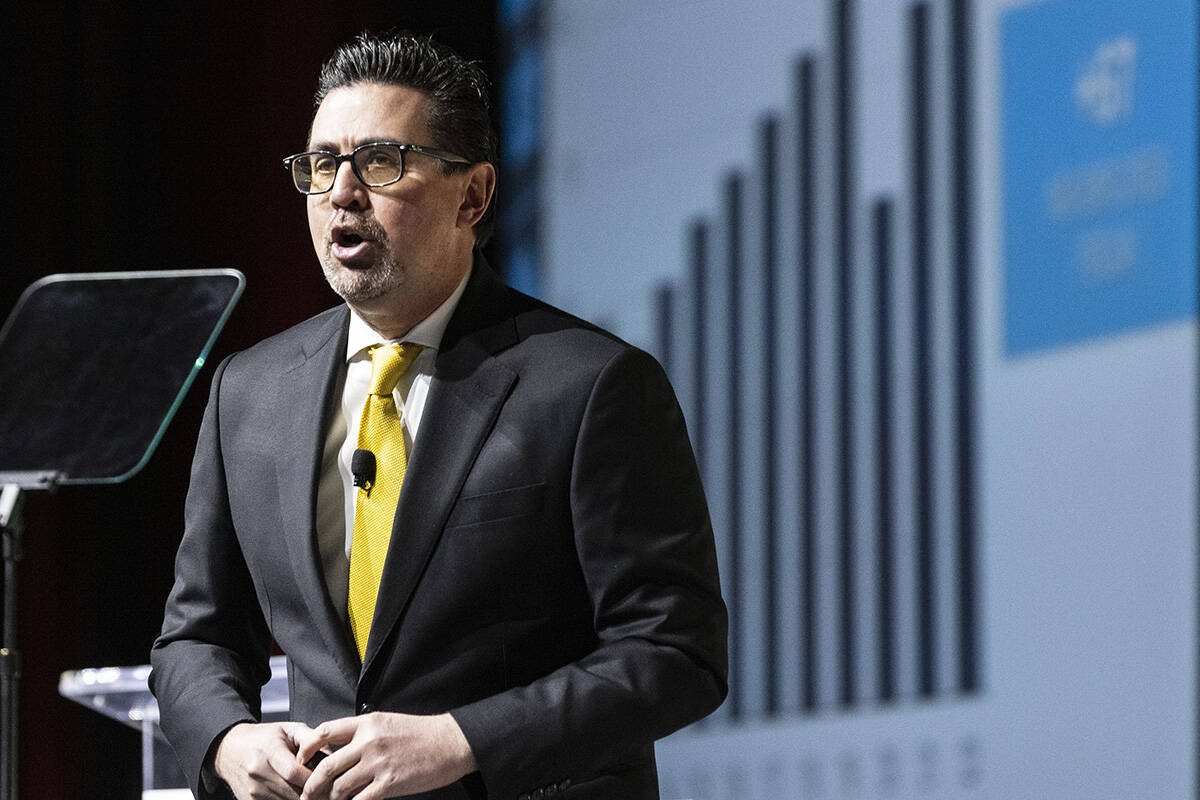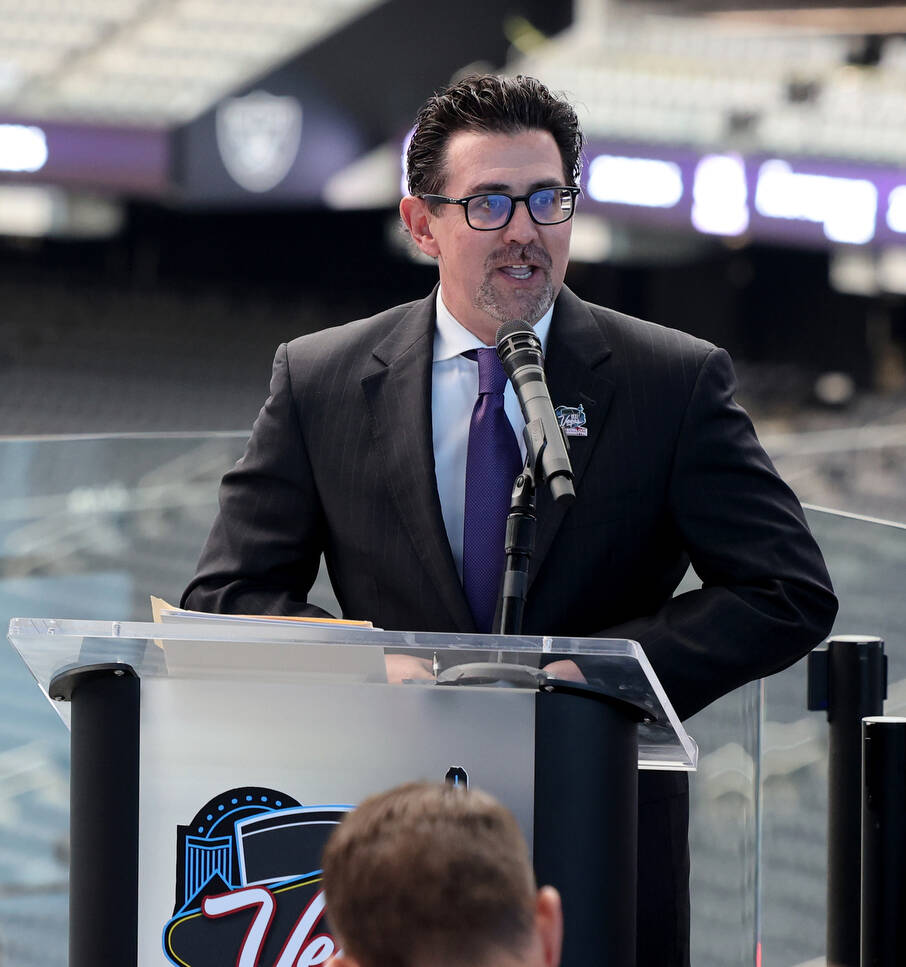Line crossed? Analyst says he did not break rules when presenting A’s bill
Analyst Jeremy Aguero said he did exactly what he “was supposed to do” in his work while at the Nevada Legislature, while some think he should have been more transparent about whose interests he served.
“We are analysts, but we’re not advocates,” he told the Las Vegas Review-Journal in an interview. “My role for the A’s was to develop legislation that would work and to develop a financial model based on the plan that they had brought forward.”
Aguero, principal analyst at the research firm Applied Analysis, faced criticism for not registering as a lobbyist and for not disclosing on the record whom he was working for during the recent legislative sessions when he presented on legislation.
He presented and answered questions on multiple occasions about the proposal to bring the Oakland Athletics to Las Vegas and build a $1.5 billion ballpark with millions in public funding. During hearings, he often identified himself as Jeremy Aguero, but he did not say he was serving as a consultant for the A’s.
Aguero and the firm were retained by the A’s to work through the economic and fiscal impacts, as well as state and local policy elements that would be necessary to facilitate the team’s potential relocation to Las Vegas, he said.
In an A’s hearing May 29, Gov. Joe Lombardo’s chief of staff, Ben Kieckhefer, identified Aguero with Treasurer Zach Conine and Steve Hill, CEO of the Las Vegas Convention and Visitors Authority and chair of the Las Vegas Stadium Authority, as “subject matter experts.”
Throughout the session, Aguero, who also served on Lombardo’s transition team, and Hill gave an optimistic outlook on the A’s ballpark. Aguero described it as “iconic” and the “shiny new attraction on the Strip,” while also noting that the project was “not without risk,” for both the A’s and the state.
“I think there was clearly some lobbying that was going on,” Assemblywoman Selena La Rue Hatch, D-Reno, told the Review-Journal.
It was not clear, she said, if Aguero was working for the A’s or for the Las Vegas Stadium Authority, which keeps him on retainer according to his biography.
“We all assumed, I think, he was working for the A’s in some capacity, but I was concerned that there was no disclosure on the record,” La Rue Hatch said. “I think that the Nevada public deserved to know, if someone is lobbying their legislators, just exactly who they’re working for and why.”
Assembly Minority Leader Philip P.K. O’Neill, R-Carson City, told the Review-Journal that he knew Aguero was speaking in favor of the stadium, so he knew to take what he was saying “with a grain of salt.”
“I think it was obvious that he was advocating,” O’Neill said, adding that he was not sure who exactly was paying Aguero.
What is a lobbyist?
Aguero never registered as a lobbyist, and the Legislative Counsel Bureau “made it clear” he did not have to, he said.
Lobbyists, as defined in state law, are people who communicate directly with a legislator on behalf of someone other than themselves to influence legislative action.
That does not include people who limit their activities to formal appearances before legislative committees and clearly identify themselves and the interests for which they are testifying. It also does not include people who limit their lobbying activities to communicating directly with a legislator “only on an infrequent or irregular basis and who do not otherwise engage in any lobbying activities.”
Aguero said he did not initiate any meetings with legislators. The only times he met with legislators to discuss the A’s bill were when he was asked to come to a legislator’s office to answer questions or talk about specific amendments included in the bill, he said, adding that he was a “technical resource” because he worked on the bulk of the modeling and some of the drafting of the bill.
A provision in every contract he signs with his clients states that he will not act as their lobbyist, Aguero said.
He has worked in similar ways with other projects, such as when he worked on the Raiders deal in 2016 and the property tax abatements in 2005 and when he chaired the Governor’s Task Force on Tax Policy in 2001.
“I try very hard to stay in the lane of analyst as opposed to advocate relative to that,” Aguero said.
He said he understands that for some legislators and others, there is an appearance that “that line is being crossed,” but he said that was never his intent.
Changes to lobbying laws?
Annette Magnus, former executive director of Battle Born Progress and a longtime lobbyist, said it is not just Aguero who should have been more transparent. She was also unsure whom Hill, for instance, was representing when discussing the A’s. She would like to see some changes to Nevada’s lobbying rules.
“I just feel like we need to get more clear with the lobbying rules in the state because rules should impact everyone, and everybody should have to abide by the same rules,” Magnus said.
The Nevada Republican Party said in a statement to the Review-Journal that the issues brought to light by the nondisclosure of lobbying activities show why the state Legislature should be subject to Nevada’s open meeting laws and ethics laws that other governmental bodies follow.
“For too long, they have operated under the guise of secrecy, with deliberate exclusion of the public and lax enforcement of rules to ensure the public can have full disclosure as to who is being paid by whom,” the party said. “We support all efforts to bring the Nevada Legislature into line with the rest of Nevada’s governmental entities which are required to adhere to Open Meeting Laws. A transparent government is a good government.”
Contact Jessica Hill at jehill@reviewjournal.com. Follow @jess_hillyeah on Twitter.























